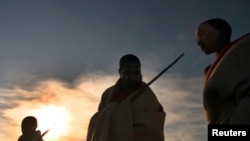Instead of celebrating their sons’ coming-of-age, this month 34 families in South Africa’s Eastern Cape province are mourning their deaths.
At least 34 young men have died this month during traditional initiation to manhood rites. The country's cultural rights commission is calling for a crackdown on schools that offer the dangerous rituals to prevent more deaths.
Initiation to manhood is a common tradition, especially among the Xhosa people. But it is also dangerous and can be deadly.
Every year, teenage boys leave their families to spend weeks with a traditional leader in the wilderness, where they also undergo circumcision.
South African officials are scrambling to understand what went wrong this season.
David Luka Mosoma is chairman of the Commission for the Promotion and Protection of the Rights of Cultural, Religious and Linguistic Communities.
"No nation prides itself by committing genocide of his sons... and no culture can be blamed for this because the deaths of an initiate is a consequence of human negligence, including the current criminal activities and commercialization of the practice,” said Mosoma.
South African Police are investigating the deaths, which authorities said appeared to be from botched circumcisions, negligence, and abuse.
Authorities earlier this month said one boy drowned after a leader forced him to swim.
The premier of Eastern Cape’s province, Oscar Mabuyane, told reporters that communities must take more responsibility to ensure safety during the rite of passage.
“Various complications that could have been avoided if men in communities played their part in the process,” said Mabuyane. "How do you explain to mothers of these boys that they died in our care because of septic wounds, dehydration and assault?”
The cultural rights commission says nearly 700 young men have died in the past decade during initiation rites, while countless more suffered botched circumcisions.
Despite public outrage sparked by the deaths, outlawing the ancestral tradition in South Africa isn’t an option.
Ubuntu Family Health Center clinical psychologist Anele Siswana studies initiation rites. He says the tradition is too important for communities.
“There's a place and relevance for what this process is about. It has a lot to do with helping young boys to become better men… what it means to be a responsible person, what it means to be a provider, what it means to be someone that provides security, what does it mean for you to be independen,” said Siswana.
Siswana says the commercialization of the tradition has contributed to the rise of illegal schools vying to make a profit.
Illegal initiation schools have been blamed for the bulk of recent fatalities.
South Africa has laws in place to ensure the safety of initiates, but rights commission chairman Mosoma says the funds and resources needed to enforce regulations are lacking.
“Specialized court (should) be introduced to fast-track charges and prosecution to deal with initiation-related crimes,” said Mosoma. "No one should be spared for committing gross violations or gross negligence.”
Meanwhile, South Africa’s Commission for the Promotion and Protection of the Rights of Cultural, Religious and Linguistic Communities is calling for the immediate closure of illegal schools and closer monitoring of registered ones.




